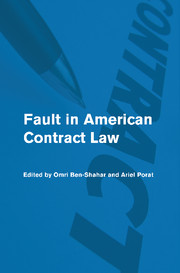Book contents
- Frontmatter
- Contents
- List of Contributors
- Preface
- Acknowledgment
- I THE CASE FOR STRICT LIABILITY
- II THE CASE FOR FAULT
- 4 How Fault Shapes Contract Law
- 5 Fault in Contract Law
- 6 The Role of Fault in Contract Law: Unconscionability, Unexpected Circumstances, Interpretation, Mistake, and Nonperformance
- III BETWEEN STRICT LIABILITY AND FAULT
- IV WILLFUL BREACH
- V COMPARATIVE FAULT
- VI THE MORALITY OF BREACH
- Case Index
- Subject Index
- References
4 - How Fault Shapes Contract Law
Published online by Cambridge University Press: 10 November 2010
- Frontmatter
- Contents
- List of Contributors
- Preface
- Acknowledgment
- I THE CASE FOR STRICT LIABILITY
- II THE CASE FOR FAULT
- 4 How Fault Shapes Contract Law
- 5 Fault in Contract Law
- 6 The Role of Fault in Contract Law: Unconscionability, Unexpected Circumstances, Interpretation, Mistake, and Nonperformance
- III BETWEEN STRICT LIABILITY AND FAULT
- IV WILLFUL BREACH
- V COMPARATIVE FAULT
- VI THE MORALITY OF BREACH
- Case Index
- Subject Index
- References
Summary
This chapter describes three defects in the traditional strict liability paradigm of contract law to demonstrate how fault significantly shapes contract law. First, justifications for strict liability focus on implementing contractual intent when contract law's main focus is interpreting contractual intent. Fault helps interpret contractual intent. Second, the strict liability paradigm excessively emphasizes a single fault variable – the ability of the promisor to control his own performance – and downplays other relevant fault variables. In particular, the strict liability paradigm ignores the potential for opportunistic behavior by the promisee, which creates a “negligence-opportunism trade-off.” A broader conception of fault emphasizes the potential for fault by both parties and the need to make relative fault assessments. Third, the strict liability paradigm overlooks doctrinal avenues in contact law that incorporate fault. One important example is the law of contract damages. Fault helps explain contract damages doctrine.
Law is an inherently normative enterprise, and so it is inevitably concerned with fault. Contract law is no exception. Yet the application of fault to contract law remains controversial. Theories and doctrines of contract law teach that contract law is and should be a regime of strict liability, rather than a fault-based regime. In my view, however, the theoretical and doctrinal justifications for strict liability in contract law are flawed, incomplete, and misleading. They unduly obscure the role of fault in contract law and hinder its effective use.
- Type
- Chapter
- Information
- Fault in American Contract Law , pp. 53 - 68Publisher: Cambridge University PressPrint publication year: 2010
References
- 1
- Cited by



